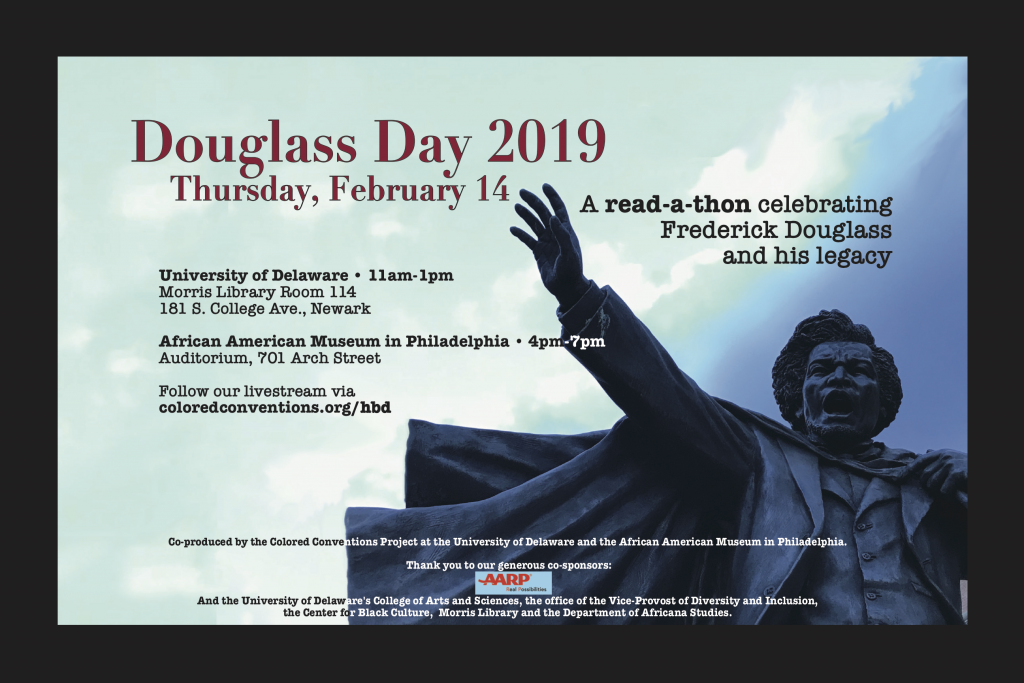Douglass Day
Each year, we celebrate the chosen birthday of Frederick Douglass on February 14th. During our celebrations, we join forces at locations around the world. We work together to transcribe an online collection of Black history and culture. We aim to make Douglass Day open to everyone. Our planning team offers guides to help you learn how to transcribe or how to bring Douglass Day into your classroom. Douglass Day makes a real difference. We help create new resources for everyone to learn about Black history.
Douglass Day is a collective act of radical love for Black history.
A Short History of Douglass Day (video)
A Short History of Douglass Day (text)
Did you know? Douglass Day helped give rise to Black History Month. It’s why we have Black History Month in February.
After Frederick Douglass passed away in 1895, many saw the importance of honoring his memory and activism. In Washington, D.C., a group led by Mary Church Terrell, (an important African American activist, educator, and author) observed Douglass’s birthday every February 14th as “Douglass Day.” See Terrell’s account of creating Douglass Day on the Library of Congress website.
Highlights of Douglass Day 2020
Archive of Past Douglass Days
Quick facts about Douglass Day
- Douglass Day celebrations began around the turn of the 20th century and helped inspire Black History Month.
- A group at the University of Delaware helped revive Douglass Day in 2017.
- Douglass Day helps create new digital resources for African American history each year. All materials created are made free & open to all.
Participation Totals
Estimated totals: ~41k people in 910 locations
- 2017 – 250 people in 9 locations
- 2018 – 1600 people in 130 locations
- 2019 – 300 people in 9 locations
- 2020 – 2800 people in 75 locations
- 2021 – 7600 people in 117 locations
- 2022 – 4500 people in 91 locations
- 2023 – 7400 people in 134 locations
- 2024 – 8500 people in 165 locations
- 2025 – 8000 people in 182 locations (and counting!)
Media Coverage
Past & current media coverage is available at https://douglassday.org/press/
Douglass Day & Colored Conventions Project
The Colored Conventions Project sparked the revival of Douglass Day as a way to celebrate Black History Month with a digital and participatory twist. Douglass Day is now an independent sister project.
Special thanks and acknowledgement are due to leaders on the Colored Conventions Project, including (among many others) P. Gabrielle Foreman, Jim Casey, Denise Burgher, Lauren Cooper, datejie cheko green, Carol Rudisell, David Kim, Allison Robinson, Brandi Locke, and Anna Lacy.
Early Douglass Day (2017-2019)
- 2017 – Colored Conventions Project and Transcribe Minutes
- 2018 – Colored Conventions Project, Smithsonian Transcription Center, and the National Museum of African American History and Culture
- 2019 – Colored Conventions Project and the African American Museum of Philadelphia
Douglass Day 2020
Featuring Anna Julia Cooper with the Moorland Spingarn Research Center at Howard University
- Program (2020)
- Activities
- Anna Julia Cooper
Douglass Day 2021
Featuring Mary Church Terrell with By The People at the Library of Congress
- Program
- Activities
- Mary Church Terrell
Douglass Day 2022
- Program
- Activities
- Colored Conventions
Douglass Day 2023
- Program
- Activities
- Transcribing (2023) + Help page
- Teaching (2023)
- Extended curriculum: Mary Ann Shadd Cary, “Why Not Go Farther?”
- Mary Ann Shadd Cary
Douglass Day 2024
- Program
- Activities
- Transcribing (2024) + Help page
- Teaching (2024)
- Frederick Douglass
Past posters


